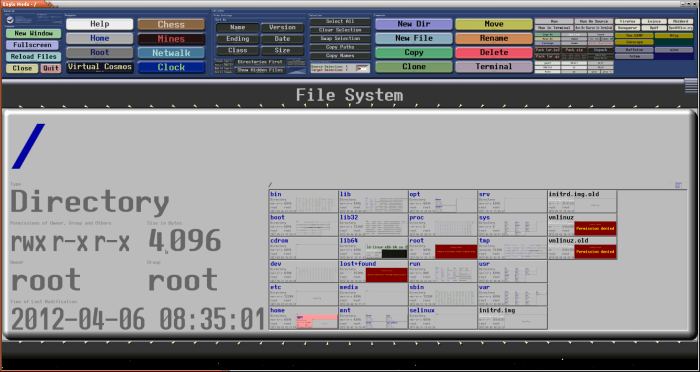Eagle Mode is a zoomable user interface (ZUI) with professional file manager, file viewers and players for most of the common file types, a chess game, a 3D mines game, a netwalk game, a multi-function clock and some fractal entertainment, all integrated in a virtual cosmos with C++ toolkit API.
In addition, Eagle Mode provides a Linux kernel configurator in the form of a kernel patch.
emFileMan is the file manager in Eagle Mode. emFileMan is a plugin application that provides a user interface for directories. By zooming and scrolling, users can browse the file system tree and see the contents of directories and files. With the view settings, users can change the order of directory listings and enable or disable the showing of hidden entries. Further, users can select files and directories for executing commands on them. The default command set is rich and includes actions such as copy, delete, archive packing/unpacking, starting of applications and many more. The command set is highly customizable.
Features include:
- Panels: Directory entry, directory, file, control.
- Separate popup-zoomed control view.
- Help texts in the things they are describing.
- Editable bookmarks.
- Multiple input methods.
- Fast anti-aliased graphics.
- Virtually unlimited depth of panel tree.
- Zoom by mouse wheel or mouse movement.
- Keyboard shortcuts.
- Portable C++ API.
Website: eaglemode.sourceforge.net
Support: Documentation
Developer: Oliver Hamann
License: GNU General Public License v3.0

Eagle Mode is written in C++. Learn C++ with our recommended free books and free tutorials.
| Popular series | |
|---|---|
| The largest compilation of the best free and open source software in the universe. Each article is supplied with a legendary ratings chart helping you to make informed decisions. | |
| Hundreds of in-depth reviews offering our unbiased and expert opinion on software. We offer helpful and impartial information. | |
| The Big List of Active Linux Distros is a large compilation of actively developed Linux distributions. | |
| Replace proprietary software with open source alternatives: Google, Microsoft, Apple, Adobe, IBM, Autodesk, Oracle, Atlassian, Corel, Cisco, Intuit, SAS, Progress, Salesforce, and Citrix | |
| Awesome Free Linux Games Tools showcases a series of tools that making gaming on Linux a more pleasurable experience. This is a new series. | |
| Machine Learning explores practical applications of machine learning and deep learning from a Linux perspective. We've written reviews of more than 40 self-hosted apps. All are free and open source. | |
| New to Linux? Read our Linux for Starters series. We start right at the basics and teach you everything you need to know to get started with Linux. | |
| Alternatives to popular CLI tools showcases essential tools that are modern replacements for core Linux utilities. | |
| Essential Linux system tools focuses on small, indispensable utilities, useful for system administrators as well as regular users. | |
| Linux utilities to maximise your productivity. Small, indispensable tools, useful for anyone running a Linux machine. | |
| Surveys popular streaming services from a Linux perspective: Amazon Music Unlimited, Myuzi, Spotify, Deezer, Tidal. | |
| Saving Money with Linux looks at how you can reduce your energy bills running Linux. | |
| Home computers became commonplace in the 1980s. Emulate home computers including the Commodore 64, Amiga, Atari ST, ZX81, Amstrad CPC, and ZX Spectrum. | |
| Now and Then examines how promising open source software fared over the years. It can be a bumpy ride. | |
| Linux at Home looks at a range of home activities where Linux can play its part, making the most of our time at home, keeping active and engaged. | |
| Linux Candy reveals the lighter side of Linux. Have some fun and escape from the daily drudgery. | |
| Getting Started with Docker helps you master Docker, a set of platform as a service products that delivers software in packages called containers. | |
| Best Free Android Apps. We showcase free Android apps that are definitely worth downloading. There's a strict eligibility criteria for inclusion in this series. | |
| These best free books accelerate your learning of every programming language. Learn a new language today! | |
| These free tutorials offer the perfect tonic to our free programming books series. | |
| Linux Around The World showcases usergroups that are relevant to Linux enthusiasts. Great ways to meet up with fellow enthusiasts. | |
| Stars and Stripes is an occasional series looking at the impact of Linux in the USA. | |
